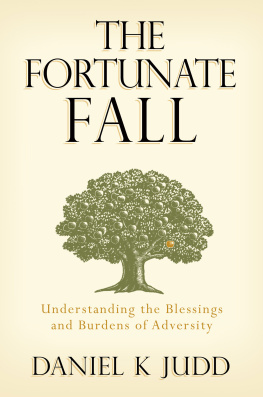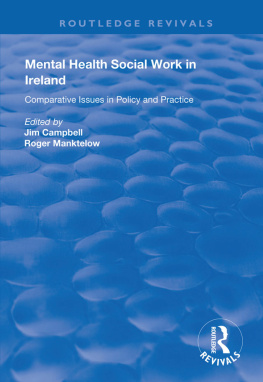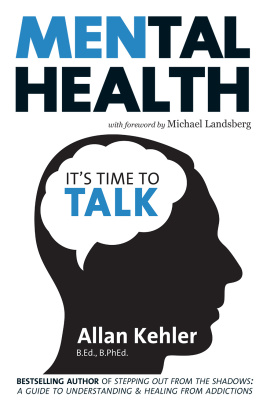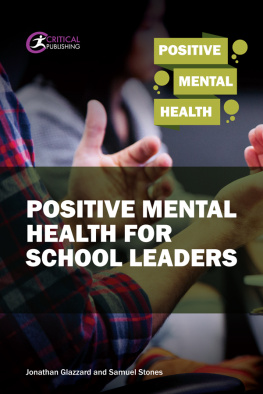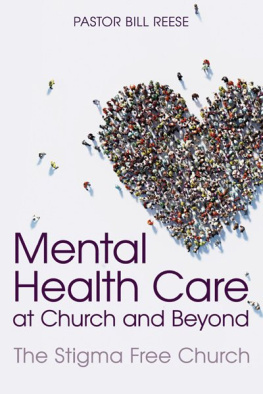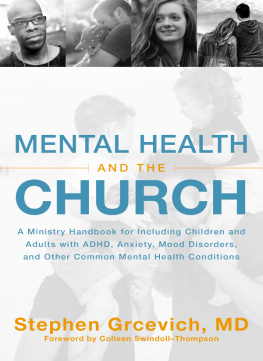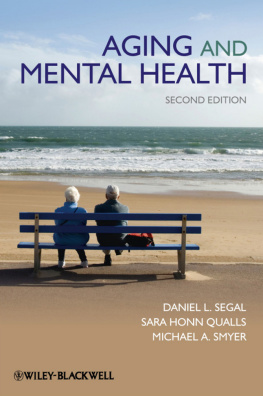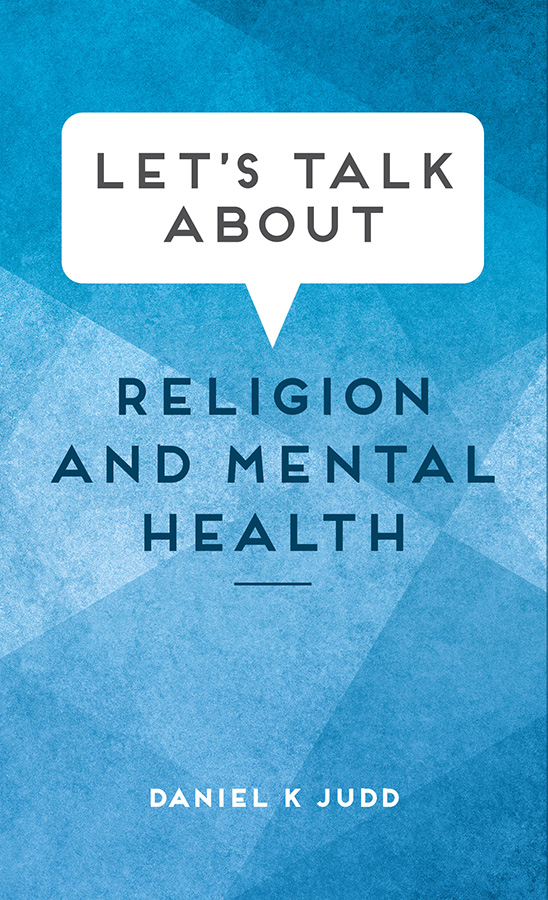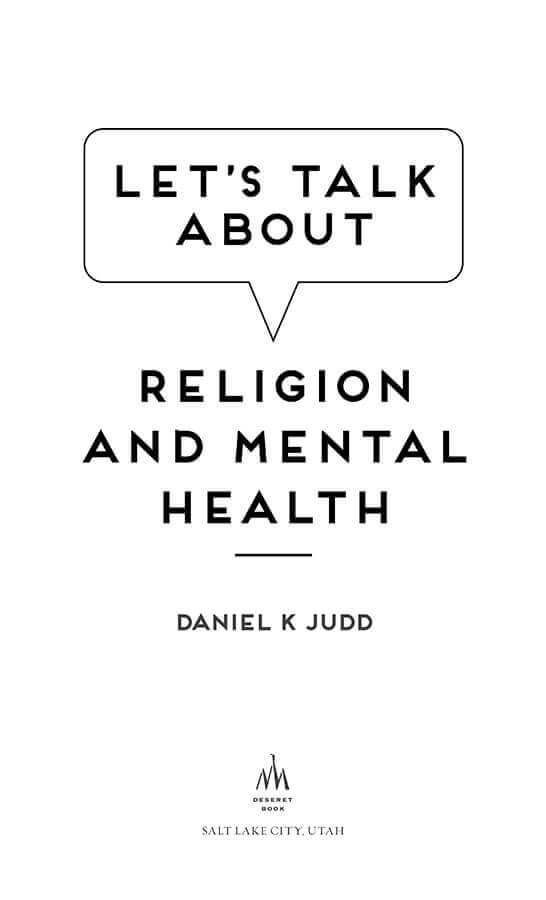All rights reserved. No part of this book may be reproduced in any form or by any means without permission in writing from the publisher, Deseret Book Company, at permissions@deseretbook.com. This work is not an official publication of The Church of Jesus Christ of Latter-day Saints. The views expressed herein are the responsibility of the author and do not necessarily represent the position of the Church, of Brigham Young University, or of Deseret Book Company.
Deseret Book is a registered trademark of Deseret Book Company.
Names: Judd, Daniel K, author.
Title: Lets talk about religion and mental health / Daniel K Judd.
Description: Salt Lake City, Utah : Deseret Book, [2021] | Series: Lets talk about | Includes bibliographical references and index. | Summary: Latter-day Saint author Daniel K Judd discusses mental health in the context of believing Latter-day Saint doctrine and policyProvided by publisher.
Identifiers: LCCN 2021016453 | ISBN 9781629728254 (paperback) | eISBN 978-1-64933-064-2 (eBook))
Subjects: LCSH: Mental healthReligious aspectsThe Church of Jesus Christ of Latter-day Saints. | Mental healthReligious aspectsMormon Church. | MormonsMental health.
This book is dedicated to Elder Jeffrey R. Holland, Professor Allen E. Bergin, and Professor Richard N. Williams.
My introduction to the study of the relationship of religion and mental health began when I read the research and writing of Professor Allen E. Bergin. Allen later became an important mentor and good friend. Professor C. Terry Warner and Professor Richard N. Williams have also been cherished friends and trusted mentors. These three remarkable scholars and friends see the world in different ways, but they share an unwavering commitment to Jesus Christ and to the restored gospel.
Many friends and colleagues at Brigham Young University have contributed to the publication of this manuscript. I especially want to thank Lori Soza, my executive assistant, and my research assistant, Brianna Bartlett Smith, for their able work. The staff of the Harold B. Lee Library has also been especially helpful, especially given the added burden of providing resources amid a worldwide pandemic.
Professor Robert L. Millet, Professor P. Scott Richards, Professor James S. Jacobs, Professor Camille Fronk Olson, Sister Virginia Hinckley Pearce Cowley, Brother Jacob Daniel Judd, and three anonymous reviewers all offered exceptionally helpful reviews.
I also want to thank all of those at Deseret Book who have made this publication possible. Special thanks to Lisa Brown Roper, Alison Palmer, Laurel Christensen Day, Sheri L. Dew, Richard Erickson, Emily Remington, Rachael Ward, and the members of Deseret Books brilliant review board.
I am grateful to my courageous wife, Kaye; our four remarkable childrenJake, Jessi, Rachel, and Adam; our sons- and daughters-in-law; and our grandchildren. Thank you for your love and support.
I am... subject to all manner of infirmities in body and mind.
Mosiah 2:11
Lets Talk about Religion and Mental Health is a brief introduction to a sobering subject that is becoming a more significant part of the lives of individuals, families, and communities among every nation, kindred, tongue and people (1 Ne. 19:17) than ever before. Over the last several years, media accounts and scholarly journals alike report an increase in a wide range of mental and emotional problems, including anxiety and depression. The World Health Organization recently stated, Globally, more than 300 million people of all ages suffer from depression.... The burden of depression and other mental health conditions is on the rise globally.
Chemical imbalances, the judgments of God, poor parenting, poverty, social isolation, social media, abusive relationships, food additives, nutrition, the environment, education, and geographic elevation are among the explanations that have been given for the presence of mental illness. In my experience, however, the reasons for the psychological problems we face and the cures we seek arent always as easy to identify as some would have us believe. Progress is being made, but identifying the origins and cures of mental and emotional disorders has been, and continues to be, one of the great challenges facing the human family.
The chapters that follow include possible reasons for the reported increases in mental and emotional challenges and how we can meaningfully address these concerns in our own lives and in the lives of those we love and serve. One of the unique contributions of this particular publication is its focus on assisting people of faith, specifically those who are members of The Church of Jesus Christ of Latter-day Saints, in identifying and navigating these difficult challenges.
This book is based on the doctrinal foundation that God is our Father, He loves us, and because we are subject to all manner of infirmities in body and mind (Mosiah 2:11), He has provided the means to heal all manner of sickness and all manner of disease (Matt. 10:1). Through the gift of the redemptive sacrifice of Jesus Christ; the guidance provided through revelation to prophets; the contributions of capable counselors, physicians, scientists, leaders, and teachers; and our own faithfulness, humility, and diligence, we can find the answers and peace we seek.
My personal study of the relationship between religion and mental health has been a significant part of my personal, professional, and pastoral journey for the past forty years. Being trained as a psychologist, serving in the Church at local and general levels, and working as a university professor have provided me with unique perspectives on the challenges we face. Most importantly, these experiences have strengthened my testimony of Jesus Christ and of the depth and power of the restored gospel, and have increased my appreciation for the blessings of academic research and clinical practice. While there are many answers yet to be discovered concerning the complexities of the relationships of religion and mental health, there is much that has been revealed that can assist us in our individual and collective journeys.
My personal experience with religion and mental health began as a young man growing up in Kanab, Utah, in the early 1970s. Even though I had a supportive family and good friends, my feelings of anxiety and despair were a heavy burden. I didnt have access to the healthcare resources that are available today, but it was during these difficult days that I found answers to many of my personal questions and concerns. I learned of my inability to overcome my physical afflictions and emotional burdens alone, which allowed me to discover the love of God; the merits, mercy, and grace of Jesus Christ; and a thirst for knowledge, both sacred and secular.


